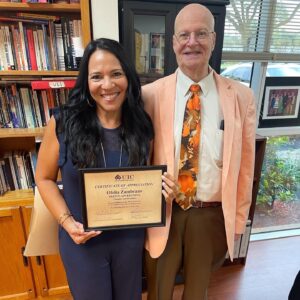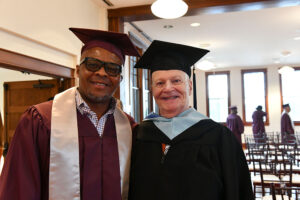Written by Deborah Viaro
English Composition Writing Student
English Composition Prof. Joseph Weisler
English Writing Tutor Prof. Jack Rose
When I was younger, I once heard a sentence that went something like this: “I remember seeing a rose, but I don’t remember seeing the rosebud in the garden” (author unknown, just a memory of mine…).
In the past, it was even possible to understand why society ignored or paid little attention to the elderly: they were relatively few and mostly relegated to invisibility within their own families – for better or for worse. Today this attitude is no longer possible.
The Brazilian singer and lyricist Arnaldo Antunes, in his song “Envelhecer” (Aging), says that the most modern thing in life is getting old.
And that is how we need to think about Aging, care for and value the Elderly, defend their role in the family and in Society and, above all, show that they, through their experience have a lot to teach the younger ones.
It is known that one of humanity’s greatest achievements was the increase in years of life, in addition to an improvement in the health of the elderly population, even if these achievements are not even close to the ideal. Reaching old age, which in the past was a privilege of few people, is now common, even in underdeveloped countries. However, this achievement has become one of the great challenges for the 21st century.
Through the research of books that deal with the subject, I was able to verify that, according to Hoyer and Roodin in the book Adult Development and Aging (2003) “… the chronological age, which quantifies the passage of time elapsed in days, months and years since the birth, is one of the most common and simplest means of obtaining information about a person. Biological age is defined by bodily and mental changes that occur throughout the development process and characterize the human aging process”. Social age, on the other hand, according to Hoyer and Roodin, is defined “through habits and social status to fulfill social roles”. The authors also define psychological age as the set of skills to which individuals adapt to the environment. It can also be defined by patterns of behavior acquired throughout life. It is understood, then, that aging is the result of a socio-historical construction experienced by the individual throughout life.
Beauvoir (1990), previously, in her book The Coming of Age, highlighted the history of old age in some societies, especially in ancient China and Japan, which favored their elderly. The old Chinese instituted a centralized and authoritarian power. According to Beauvoir, “Confucius modeled in the image of the collectivity the microcosm that gave it the family as its basis. The whole house owed obedience to the older man”. It is believed that the elderly person was seen as possessing a certain supernatural power, due to their long life, occupying a prominent place, associating wisdom and experience. Also, according to Confucius, old age brings with it wisdom: “At 15, he devoted himself to the study of wisdom; at 30, I confirmed myself in it; at 40 I had no doubts, at 60 nothing else in the world could shock me; at 70 I could follow the dictates of my heart without transgressing the moral law”. Beauvoir claimed that the idea of honor was related to old age. For the author, old age was integrated with wisdom, with longevity giving her experience and authority.
Also, during our recent works through book reading, the movie and interpreting them, I was able to understand and admire “The Help”, a book based on the novel by Kathryn Stockett, where the aspiring writer, Skeeter, decides to write a book from the point of view of maids on the white families they worked for, along with the difficulties they regularly suffered. New friendships and bonds were formed, and Skeeter ends up shaking an entire Society when these untold stories are shared with the general public.
And so, I learned to admire Skeeter, this young writer who through her book showed the racism suffered by maids in white houses; I also learned to admire amazing characters like Minny Jackson and Aibileen Clark, people who never played poor things or put themselves in a victim position because they didn’t need to, but in the end, their voices could be heard and changed the understanding of those people within the context in which they lived.
Inspired by Skeeter, obviously without any pretensions, my challenge will be, not how she did it, but using another instrument, yes because obviously I’m not going to write a book, but somehow show how much we can value the elders; how much your “life baggage” built over the years is useful and still very important to us.
And still inspired by Skeeter, since I couldn’t interview him in person, I tried to discover a little of the “life story” of someone who, despite knowing very little, already had time to admire and recognize his great value. I am talking nothing less than Professor Jack J. Rose, a dear Professor at UIC, who upon my request, took no more than two hours to present me an interview, recently conducted by a student. By reading his “Curriculum of Life”, and not a Professional, I could
understand why a person who, honestly, even though I have no idea of his age (and not the indiscretion of asking, because for me this is just a detail), has a unique ability to bring to us, “simple mortals”, a little of its great wisdom.
I will now transcribe (duly authorized by him) just a little of the interview he sent me, requested by me with the aim of enriching my work, but whose author was not informed to me.
“One of the most respected and loved professor at United International College is Professor Rose. I had the pleasure of interviewing Professor Rose recently, and I have been a student in his Business Expo class. Due to his reputation, I was so excited when I learned he would be my professor. Every student at UIC knows that he truly cares about all his students, and he constantly motivate them to learn and grow. However, I didn’t know much about his background until I interviewed him.

Professor Rose started working at the age of eight selling newspapers on a street corner in New Jersey where he grew up. At the age of 12, he started his own business taking orders at the local beauty salon for breakfast, lunch, and mid-afternoon. This particular salon had 18 hairdressers, 4 shampoo girls, and 8 manicurists, so we know it was a very busy place. He made a deal with a local luncheonette that he would take the orders, get them filled, and deliver them. He even set up an account for the workers who were too busy to stop and pay after each delivery. He worked on tips and then informed his boss that he was leaving and working with another local restaurant because they were going to pay him $20.00 per day, plus tips. He was happy when his boss agreed to pay him. He worked after school on Friday and all-day Saturday, making anywhere between $50-75, which, at that time, was great pay.
Professor Rose has his own marketing and management consulting company, and we wonder when he has time to sleep. I asked him that very question, and he said, “I’m like the Energizer Bunny in that every so often, I spend Sunday in bed watching sports, while I recharge my batteries.” He adds, “I love working with students and hope I contribute a little bit to their future.” Professor Rose, you have contributed much to our futures and know how much you are loved, respected, and admired. Thank you for always caring and sharing your expertise with us”.
How can we not admire and fail to extol such ability? Perhaps only one book would translate the life experience of this Professional who, in all his classes, shares all his years of experience with his students.
In addition to Professor Rose’s example, I would also like to mention a dear aunt in Brazil. Aunt Janete. An 87-year-old widow who, with her daughter, manages a Portuguese candy factory in a city in the interior of the state of São Paulo. Aunt Janete is tireless; every day she works in the Factory’s Production Sector, when she is not paying attention to one of the many customers who insist on being served by her. And she is the one who makes all the purchases of the necessary supplies to make the candies. We know that the Purchasing Sector is one of the most important of a Company, you can only sell well if you buy well. And so follows Tia Janete with her prosperous company with almost 40 years of existence.

And the reason I made a point of mentioning, even paying homage to these two nice and dear figures, is precisely for all the capacity of both of them who, “at the best age”, still productive, insist on continuing to work, being examples and “school” for many young people.
The elderly is increasingly active, taking care of health and working, being involved in social, economic, cultural, spiritual, and civil issues. As Linda Gorman puts it, “…increasing life expectancy in the United States has been associated with healthier life expectancy. Thus, it is possible for Americans to respond by working more or saving more during their working lives.”
It is also worth mentioning the autonomy of these “Professionals” (I prefer to refer to this than “these Seniors”) in managing their own financial life, often even helping with the family’s income. They are totally capable! According to Anek Belbase and Geoffrey T. Sanzenbacher, in Cognitive Aging and the Capacity to Manage Money to pay the bills, handle debt, and maintain good credit for workers in their 50s and 60s. For example, one study that directly measured financial capability using a standardized test found that 95 percent of adults without cognitive impairment were fully able to manage their own finances.”
And so, they continue to contribute, teaching a little of their “Old Age” to the “Young” ones.
Aging is to write once more (rewrite) what has already been written, regardless of whether this writing was more difficult, painful, or smoother and calmer. It is giving new meanings to the text of life; it is to continue stimulating the body, the mind; is to keep dreaming, working; is to produce!
For further information, contact United International College at (954) 607-4344. Learn more about UIC’s Business Programs.
